Should We Continue to Fund Space Exploration
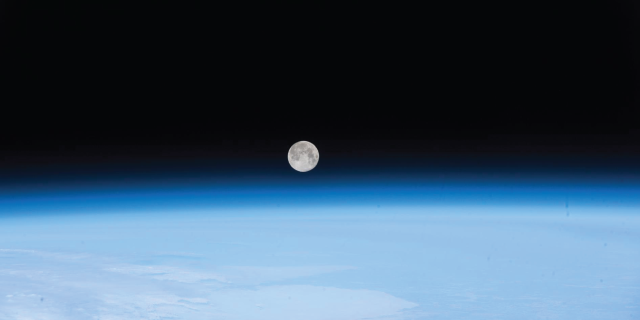
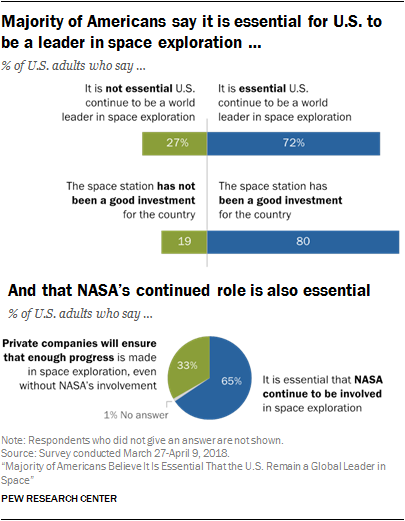 Sixty years after the founding of the National Aeronautics and Space Administration (NASA), most Americans believe the United States should be at the forefront of global leadership in space exploration. Majorities say the International Space Station has been a good investment for the country and that, on balance, NASA is still vital to the future of U.S. space exploration even as private space companies emerge as increasingly important players.
Sixty years after the founding of the National Aeronautics and Space Administration (NASA), most Americans believe the United States should be at the forefront of global leadership in space exploration. Majorities say the International Space Station has been a good investment for the country and that, on balance, NASA is still vital to the future of U.S. space exploration even as private space companies emerge as increasingly important players.
Roughly seven-in-ten Americans (72%) say it is essential for the U.S. to continue to be a world leader in space exploration, and eight-in-ten (80%) say the space station has been a good investment for the country, according to a new Pew Research Center survey conducted March 27-April 9, 2018.
These survey results come at a time when NASA finds itself in a much different world from the one that existed when the Apollo astronauts first set foot on the moon nearly half a century ago. The Cold War space race has receded into history, but other countries (including China, Japan and India) have emerged as significant international players in space exploration.
And, as the private sector increasingly ventures into space – through companies such as SpaceX, Blue Origin and Virgin Galactic – 65% of Americans believe NASA should still play a vital role in the exploration of space, while a third (33%) say private companies will ensure enough progress in this area even without NASA's involvement.
Strong public support that the U.S. should continue to be at the vanguard of space exploration is widely shared across gender, educational and political groups. Each generational group, for example, expresses nearly equal levels of strong support for continued U.S. space leadership – from Baby Boomer and older generations (71%) who lived through the "Right Stuff" era that pioneered space exploration to Millennials (70%) who grew up during the space shuttle program. Indeed, on most issues regarding NASA and space exploration, there are no more than modest differences among the generational cohorts. See the Appendix for details.
Similarly, majorities across gender, generation, education and political groups see benefits from government investment in one of NASA's signature projects, the International Space Station (ISS). The findings – support for the U.S. being at the forefront of space exploration and the perception that the space station has been a good investment – are broadly consistent with previous Pew Research Center surveys, which used somewhat different wording and polling methods.
While the ISS has proven to be an enduring legacy of the U.S. space program, it is also emblematic of changing times. NASA currently relies in part on the Dragon spacecraft, built and operated by Elon Musk's SpaceX company, to deliver supplies to the orbiting laboratory. And the Trump administration has been exploring the possibility of turning the space station into a commercially run venture after 2024.
As Americans consider the future of the U.S. space program, most (65%) still see an essential role for NASA, while a third (33%) believe "private companies will ensure that enough progress is made in space exploration, even without NASA's involvement." Democrats and independents who lean Democratic are more likely than Republicans and independents who lean Republican to believe that NASA should continue to play a role in space exploration (70% vs. 59%). Conservative Republicans are closely divided on this issue (53% to 47%), though two-thirds (67%) of moderate or liberal Republicans believe a continued role for NASA in U.S. space exploration is essential.
Majorities say monitoring climate or tracking asteroids should be a top NASA priority; only 13% say the same of putting astronauts on the moon
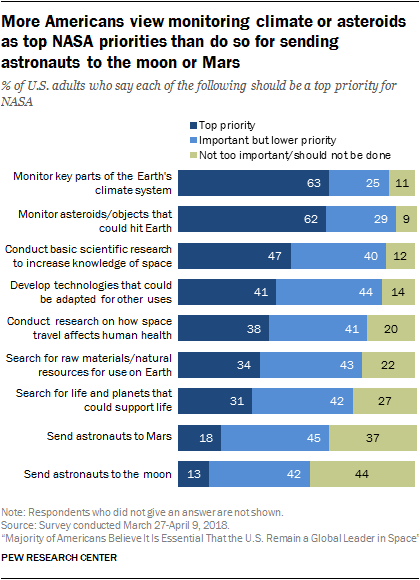 NASA oversees a diverse portfolio of space-related missions, from sending robotic probes to explore distant planets to launching satellites that study Earth's atmosphere and oceans.
NASA oversees a diverse portfolio of space-related missions, from sending robotic probes to explore distant planets to launching satellites that study Earth's atmosphere and oceans.
When asked to rate the importance of nine of these missions, majorities of Americans say a top priority for NASA should be monitoring key parts of the Earth's climate system (63%) or monitoring asteroids and other objects that could potentially collide with the Earth (62%).
Slightly fewer than half of Americans (47%) believe that conducting basic scientific research to increase knowledge and understanding of space should be a top priority, with 40% saying such research is an important but lower priority. Some 41% say developing technologies that could be adapted for uses other than space exploration should be a top priority, and 44% characterize it as an important but lower priority for NASA. And 38% believe NASA should make it a top priority to conduct scientific research on how space travel affects human health, while 41% see it as an important but lower priority.
Around one-third of U.S. adults say that searching for raw materials and natural resources that could be used on Earth (34%) or searching for life and planets that could support life (31%) should be top priorities; 22% and 27% of Americans say, respectively, that these missions are not too important or shouldn't be pursued.
Missions for human astronauts to explore Mars and return to the moon are among NASA's most high-profile programs. The Trump administration has expressed strong support for these initiatives, saying that exploring the solar system should be NASA's core mission, beginning with a return of astronauts to the moon.
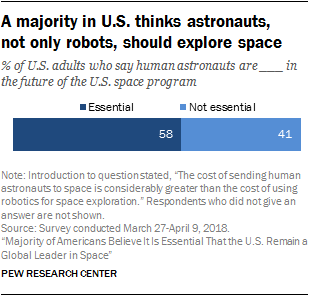 However, compared with other NASA programs, fewer Americans say such space exploration should be a top priority. Just 18% and 13%, respectively, say that sending astronauts to Mars or back to the moon should be a top priority; 37% and 44%, respectively, express the view that these missions are not too important or that NASA shouldn't undertake these missions.
However, compared with other NASA programs, fewer Americans say such space exploration should be a top priority. Just 18% and 13%, respectively, say that sending astronauts to Mars or back to the moon should be a top priority; 37% and 44%, respectively, express the view that these missions are not too important or that NASA shouldn't undertake these missions.
Some space experts argue that the life support systems required to sustain astronauts on a long interplanetary journey would be so expensive that it would be more cost-effective to send robotic probes.1 With regards to future expeditions into space, a majority of Americans say they would consider it essential that humans, not solely robots, make the trip. Overall, 58% of U.S. adults believe it is essential to include the use of human astronauts in the U.S. space program, while 41% say astronauts are not essential.
Republicans and Democrats tend to agree about the relative priorities of NASA's efforts. For example, about six-in-ten of each party say that monitoring asteroids should be a top priority for NASA (61% of Republicans and 63% of Democrats, including those who lean to each party). But Republicans tend to put monitoring the Earth's climate system as a lower priority for the agency, consistent with long-standing political divides over climate issues. Fewer Republicans and Republican-leaning independents (44%) than Democrats and Democratic leaners (78%) believe that monitoring the Earth's climate system should be a top priority for NASA. Some 38% of Republicans say that monitoring the Earth's climate system should be an important but lower priority, and 17% say this is not too important or should not be done.
Republicans are also less likely than Democrats to see basic scientific research to further knowledge of space as a top priority. Some 38% of Republicans and those who lean to the GOP consider this a top priority for NASA, while 46% call it an important but lower priority. About half (53%) of Democrats and leaners consider basic scientific research a top priority for the agency.
The new survey finds men more likely than women to consider several of these missions a top priority for NASA, including conducting basic scientific research (54% of men vs. 40% of women say this should be a top priority). While a minority considers putting astronauts in space a top priority for NASA, more men (25%) than women (11%) consider human exploration of Mars a top priority.
In addition, while about half or more of men and women believe human astronauts are essential for the U.S. space program, more men (63%) than women (54%) hold this view. This finding is in keeping with a 2014 Pew Research Center survey, which used somewhat different question wording and polling methods. (Also see Appendix for views on these issues by gender.)
Men also tend to express more interest in space and astronomy news, according to a 2017 Pew Research Center survey as well as surveys conducted for this year's Science and Engineering Indicators report.
There are no more than modest differences by education level in agency priorities. One exception is that those with at least a postgraduate degree are more likely than those with high school or less education to consider basic scientific research a top priority for NASA (63% vs. 38%). See Appendix for details.
Most Americans express confidence that private space companies will be profitable, but are skeptical that those companies will minimize hazardous space debris
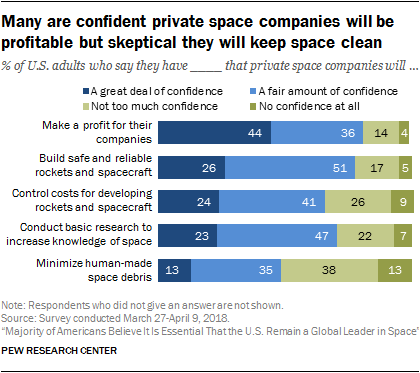 Private companies such as SpaceX, Blue Origin and Virgin Galactic continue to develop space exploration capabilities that were once the sole purview of government agencies such as NASA. Some 44% of Americans have a great deal of confidence these companies will make a profit in their space-related ventures, with 36% saying they are fairly confident that space companies will be profitable.
Private companies such as SpaceX, Blue Origin and Virgin Galactic continue to develop space exploration capabilities that were once the sole purview of government agencies such as NASA. Some 44% of Americans have a great deal of confidence these companies will make a profit in their space-related ventures, with 36% saying they are fairly confident that space companies will be profitable.
Although most Americans believe that NASA still has an essential role to play in the exploration of space, they also express confidence that private companies can make meaningful contributions in such areas as developing safe spacecraft and conducting research to expand scientific knowledge.
For instance, about one-in-four Americans say they have a great deal of confidence that private companies will build safe and reliable rockets and spacecraft (26%), and around half of Americans (51%) have at least a fair amount of confidence that space companies will be able to do so.
Americans are by and large confident about the ability of private companies to control the costs of developing rockets and spacecraft – 24% have a great deal of confidence and 41% have a fair amount of confidence, compared with 34% who have "not too much" confidence or no confidence at all. Moreover, 23% have a great deal of confidence and 47% have a fair amount of confidence that companies will conduct basic research to increase knowledge of space, compared with 29% who don't have much confidence or have no confidence at all.
Americans, however, tend to be skeptical about whether private companies will minimize human-made space debris, which increasingly poses a hazard to orbiting satellites and space stations. Only 13% of U.S. adults have a great deal of confidence that companies will minimize that problem, with 35% saying they have a fair amount of confidence. By comparison, about half of Americans (51%) have not too much or no confidence that private companies will minimize human-made space debris.
Men express more confidence than women in private space companies' abilities in most of these areas, particularly when it comes to building cost-effective and safe spacecraft. For example, 74% of men but 56% of women have at least a fair amount of confidence these companies will control costs, and 85% of men vs. 69% of women have at least a fair amount of confidence that private companies will build safe and reliable spacecraft.
Americans most attentive to space news especially value U.S. global leadership but are closely divided over importance of NASA in future space exploration
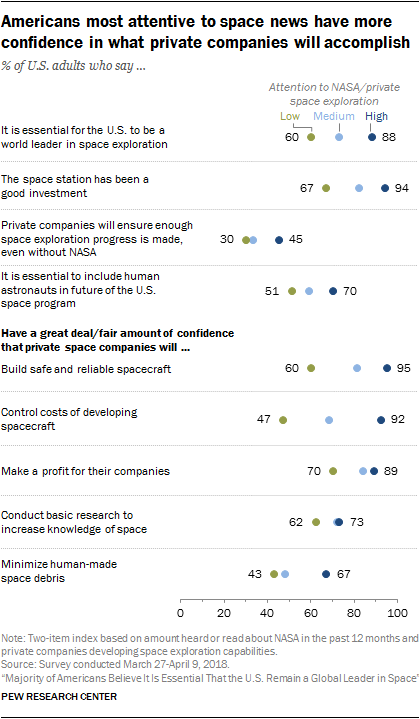 A small share of the public, just 7%, is particularly attentive to space news, saying they have heard "a lot" about NASA in the past year and "a lot" about private space companies. About a fifth of Americans (22%) have heard "nothing at all" about both of these while most Americans (71%) fall in between these two extremes, having heard at least a little either about NASA or about private companies developing space exploration capabilities.2
A small share of the public, just 7%, is particularly attentive to space news, saying they have heard "a lot" about NASA in the past year and "a lot" about private space companies. About a fifth of Americans (22%) have heard "nothing at all" about both of these while most Americans (71%) fall in between these two extremes, having heard at least a little either about NASA or about private companies developing space exploration capabilities.2
Those most attentive to space news stand out from other Americans for their strong support for the U.S. being a world leader in space exploration and their belief that the International Space Station has been a good investment for the country. For instance, 88% of those who have heard a lot of space news believe it is essential for the U.S. to be a global leader in space exploration, compared with 60% of those who have heard nothing about NASA and private space companies. And 94% of the most space-attentive Americans consider the space station to have been a good investment for the country, compared with 67% of those who have heard nothing about space news.
When thinking about priorities for NASA, Americans who are highly attentive to space news put more priority than other Americans on research missions such as basic scientific research and learning about the health effects of space travel. For example, three-quarters (75%) of those highly attentive to space news believe basic scientific research should be a top priority for NASA versus 31% of those with low attention to such news. Indeed, the share of this space-attentive group that considers basic research a top priority is similar to the shares who say the same about monitoring objects in space that could collide with Earth (69%) and monitoring the climate system (68%).
But, while those who pay a lot of attention to space news tend to put more priority than other Americans on NASA's research missions, they are more closely divided than other Americans over the importance of NASA's role in space exploration going forward. Among the most attentive, 55% say it is essential that NASA continue to be involved in U.S. space exploration, while 45% say private companies will ensure enough progress even without NASA's involvement. Among other Americans, the balance of opinion leans more clearly toward NASA remaining involved. For example, 66% of those who pay a medium level of attention to space news say it is essential for NASA to remain involved, as do 68% of those with low attention to space news.
Those who have heard a lot about space news also tend to express more confidence in private space companies to handle key aspects of space exploration, especially building safe and cost-effective spacecraft. For example, 95% of Americans who are most attentive to news about NASA and private space companies have at least a fair amount of confidence that those companies will build safe and reliable rockets and spacecraft; 58% of this group has a great deal of confidence in companies to do this. By comparison, 60% of those who have heard nothing about NASA and private space companies have at least a fair amount of confidence in private companies to build safe and reliable spacecraft.
Space tourism? A majority of Americans say it's not for them, but 63% of Millennials are interested
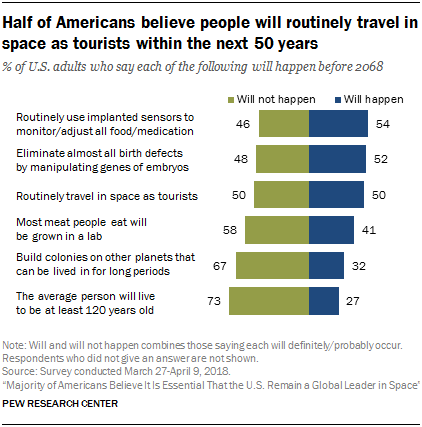 Americans expect a range of scientific and technological developments ahead. But the public is divided over the prospects for space tourism in the next 50 years. Half (50%) believe this will happen while half are skeptical this will be routine for ordinary people. About a third of Americans (32%) believe that colonies on other planets – habitable for long periods of time – will be built by the year 2068, while two-thirds (67%) doubt this will happen.
Americans expect a range of scientific and technological developments ahead. But the public is divided over the prospects for space tourism in the next 50 years. Half (50%) believe this will happen while half are skeptical this will be routine for ordinary people. About a third of Americans (32%) believe that colonies on other planets – habitable for long periods of time – will be built by the year 2068, while two-thirds (67%) doubt this will happen.
As the public considers the possibilities ahead for ordinary citizens to orbit the Earth in a spacecraft, more Americans say they would not want to orbit the Earth than say they would (58% to 42%).
Interest in orbiting the Earth is greater among younger generations, men and those who are more attentive to space news. Some 63% of Millennials (born 1981 to 1996) say they are definitely or probably interested in space tourism, compared with 39% of Gen Xers (born 1965 to 1980) and 27% of those in the Baby Boomer or older generations. Across all generations, men are more likely than women (51% vs. 33%) to say they are interested in traveling into space as tourists.
Those who have heard or read a lot about NASA and private space companies are much more likely (74%) to say they are interested in space tourism than those who have heard nothing about such space news (30%).
Among the 42% of Americans who would be interested in traveling into space, 45% of them say the main reason for their interest would be to "experience something unique." Some 29% of this group say they would go so that they can see the view of Earth from space, while 20% want to "learn more about the world."
The 58% of U.S. adults who say they wouldn't want to orbit the Earth aboard a spacecraft believe that such a trip would be either "too expensive" (28% of those asked) or "too scary" (28%), or that their age or health wouldn't allow it (28%). Some 16% of those not interested in space travel offered reasons other than the three options in the survey.
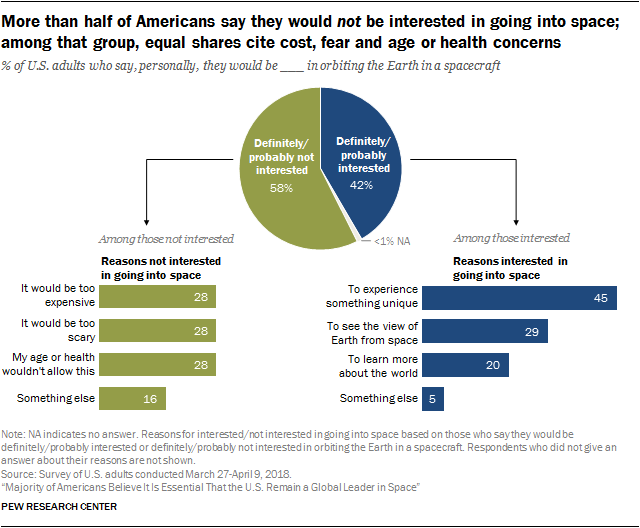
Source: https://www.pewresearch.org/science/2018/06/06/majority-of-americans-believe-it-is-essential-that-the-u-s-remain-a-global-leader-in-space/
0 Response to "Should We Continue to Fund Space Exploration"
Post a Comment